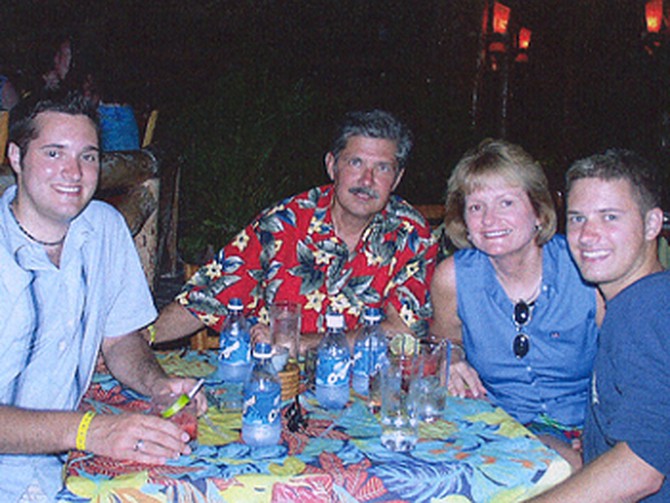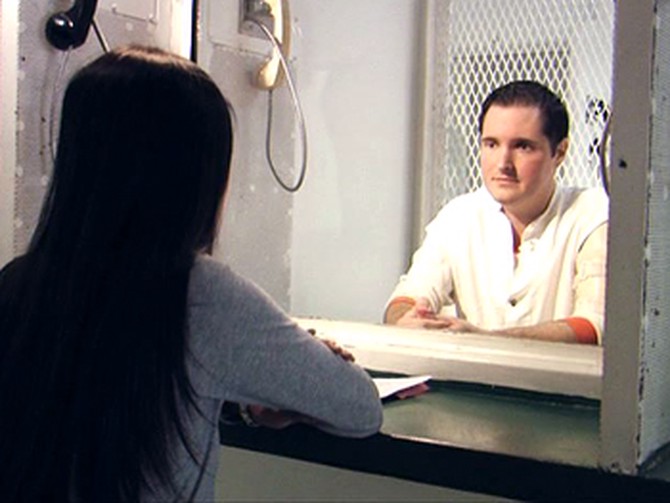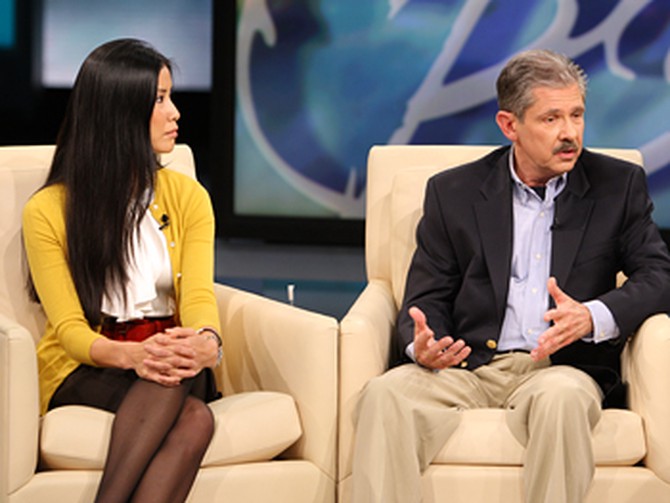The Gift of Forgiveness

Friends say Kent and Tricia Whitaker had one of the kindest families you could ever hope to know. Their house in Sugar Land, Texas, was a gathering spot for friends of their sons—smart, athletic Bart and outgoing, popular Kevin.
On December 10, 2003, the Whitakers returned home from a dinner celebrating Bart's graduation from Sam Houston State University. When they opened the door, Tricia and Kevin were immediately shot in their chests by a gunman inside the house. Kent ran to the door to see what happened and was shot in the shoulder. Then Bart ran into the living room and was shot too.
Neighbors and a wounded Bart called 911. Tricia and Kevin died from their wounds; Bart and Kent survived and were hospitalized for four days. While he was in the hospital, just hours after the attack, Kent promised himself that he would forgive the person who killed his wife and son.
Lisa Ling went to Texas to report on this case.
On December 10, 2003, the Whitakers returned home from a dinner celebrating Bart's graduation from Sam Houston State University. When they opened the door, Tricia and Kevin were immediately shot in their chests by a gunman inside the house. Kent ran to the door to see what happened and was shot in the shoulder. Then Bart ran into the living room and was shot too.
Neighbors and a wounded Bart called 911. Tricia and Kevin died from their wounds; Bart and Kent survived and were hospitalized for four days. While he was in the hospital, just hours after the attack, Kent promised himself that he would forgive the person who killed his wife and son.
Lisa Ling went to Texas to report on this case.

Sergeant Marshall Slot, the lead investigator on the case, tells Lisa that while the community in Sugar Land was convinced a crazed murderer was on the loose, police began their investigation by interviewing Bart and Kent.
"We did the walk-through interviews with Kent and Bart. We did them separately so that neither one of them could taint the other's walk-through. When I spoke with Kent, Kent was very exact. Kent was very expressive in talking about the shots," Sergeant Slot says. "Bart was very guarded in his words. He wouldn't commit to anything."
Police learned that while the Whitaker family was murdered coming home from a dinner celebrating Bart's graduation from Sam Houston State, he actually was on academic probation at the school. In fact, Bart only had enough credits to qualify as a freshman.
Investigators also learned that police had been dispatched to the Whitaker house two years earlier. After an informant's tip, they warned Tricia and Kent that Bart was overheard plotting to have his family killed. "Kent and Tricia allegedly confronted Bart, and he said that it was part of a drunken joke. And they believed him," Lisa says. "Tricia apparently told a friend that she was concerned about it, but she just couldn't believe that it could be true."
"We did the walk-through interviews with Kent and Bart. We did them separately so that neither one of them could taint the other's walk-through. When I spoke with Kent, Kent was very exact. Kent was very expressive in talking about the shots," Sergeant Slot says. "Bart was very guarded in his words. He wouldn't commit to anything."
Police learned that while the Whitaker family was murdered coming home from a dinner celebrating Bart's graduation from Sam Houston State, he actually was on academic probation at the school. In fact, Bart only had enough credits to qualify as a freshman.
Investigators also learned that police had been dispatched to the Whitaker house two years earlier. After an informant's tip, they warned Tricia and Kent that Bart was overheard plotting to have his family killed. "Kent and Tricia allegedly confronted Bart, and he said that it was part of a drunken joke. And they believed him," Lisa says. "Tricia apparently told a friend that she was concerned about it, but she just couldn't believe that it could be true."

As police continued their investigation, one of Bart's friends gave them the breakthrough they needed. After being brought in for questioning, 21-year-old Steven Champagne confessed Bart had convinced him and another friend, Christopher Brashear, to kill Bart's family. Police were ready to close in, but Bart disappeared.
More than a year later, a tip led authorities to Mexico. There they found Bart living under an assumed name. Bart had been working at a furniture store and had dated his boss's daughter. Bart was arrested, taken back to Texas and put on trial. He was convicted of capital murder and sentenced to death.
More than a year later, a tip led authorities to Mexico. There they found Bart living under an assumed name. Bart had been working at a furniture store and had dated his boss's daughter. Bart was arrested, taken back to Texas and put on trial. He was convicted of capital murder and sentenced to death.

The first time police confronted Kent with evidence about Bart, they both were still in the hospital. They asked Kent about the discrepancy between Bart's graduation claims and his college transcript. Kent says his first instinct was to not believe it. "I went down to his room ... and confronted him with it. He said that it had been the result of scheduling problems at work," Kent says. "He thought he'd be able to make up the deficit the next semester."
Kent says he was conflicted. He says he knew the police could be right, but he didn't want to abandon his son. "I thought, 'Well, I'll just work with both sides. I'll help Bart as he needs help, and I'll help the police. And if I hear something, then I'll tell them.' I kept my neutrality on it."
Even though Bart was considered a suspect early in the investigation, Kent lived with him for seven months—despite repeated warnings about his safety from the police—in the house where the shootings occurred. "I'd reached a zone when I got up to the front door where I was just numb and it was like I was a robot, and I passed by the spots [where Tricia and Kevin died]," he says. "People ask me how I could possibly live in that house. And while there was something very horrible that happened there, it was still my home and had been my home for 25 years. And there were a lot of great memories there, and it was still my house."
As the evidence against Bart grew, Kent says his opinion about his son's innocence changed. At the beginning, he says he thought there was a 5 percent chance police were right. Within four to five weeks, Kent says, he started thinking the chance that Bart was guilty was "about 50-50."
"But by the time that he actually ran, I was probably 80 percent believing that he was responsible," Kent says. "But I wasn't going to desert him anyway. He's my son."
Kent says he was conflicted. He says he knew the police could be right, but he didn't want to abandon his son. "I thought, 'Well, I'll just work with both sides. I'll help Bart as he needs help, and I'll help the police. And if I hear something, then I'll tell them.' I kept my neutrality on it."
Even though Bart was considered a suspect early in the investigation, Kent lived with him for seven months—despite repeated warnings about his safety from the police—in the house where the shootings occurred. "I'd reached a zone when I got up to the front door where I was just numb and it was like I was a robot, and I passed by the spots [where Tricia and Kevin died]," he says. "People ask me how I could possibly live in that house. And while there was something very horrible that happened there, it was still my home and had been my home for 25 years. And there were a lot of great memories there, and it was still my house."
As the evidence against Bart grew, Kent says his opinion about his son's innocence changed. At the beginning, he says he thought there was a 5 percent chance police were right. Within four to five weeks, Kent says, he started thinking the chance that Bart was guilty was "about 50-50."
"But by the time that he actually ran, I was probably 80 percent believing that he was responsible," Kent says. "But I wasn't going to desert him anyway. He's my son."

Lisa travels to the Texas prison where Bart sits on death row to ask the question on everyone's mind—why did he want to kill his family?
"I can go back and tell you why I felt so inadequate and why I felt that my parents didn't love me, and I recognize so many of the errors now," Bart says. "There's a difference between an excuse and a reason, and I don't try to make excuses for what I did."
Bart says he believed his family loved an idealized version of himself that he could never live up to. "You can only go through that for so long before you start to bear a grudge against the people you think have set that high standard," he says.
Although Bart says he loved his brother, Kevin, he says he was envious of him at the same time. "He had so many of the qualities that I tried so hard for over the years," he says. "People just loved him always."
Over time, Bart says his thoughts about his family turned to hatred. "I wanted my life to be different, and however my thought process got there, I blame them for me," he says. "I blame them for me being in existence. I wanted revenge for being alive."
"I can go back and tell you why I felt so inadequate and why I felt that my parents didn't love me, and I recognize so many of the errors now," Bart says. "There's a difference between an excuse and a reason, and I don't try to make excuses for what I did."
Bart says he believed his family loved an idealized version of himself that he could never live up to. "You can only go through that for so long before you start to bear a grudge against the people you think have set that high standard," he says.
Although Bart says he loved his brother, Kevin, he says he was envious of him at the same time. "He had so many of the qualities that I tried so hard for over the years," he says. "People just loved him always."
Over time, Bart says his thoughts about his family turned to hatred. "I wanted my life to be different, and however my thought process got there, I blame them for me," he says. "I blame them for me being in existence. I wanted revenge for being alive."

After her hour-long interview, Lisa says she couldn't be sure if she met the real Bart. "My sense is that he still doesn't know who he is," she says. "I think that for years he was deceiving everyone, even the people closest to him. He started living this lie, and he no longer could make a distinction between what was a lie and what was reality."
Kent says he thinks he knows his son better than he did before. "I think he's changed, but I don't know that he has," Kent says. "I can't truly read his heart. I thought I'd read his heart for all these years."
Because Kent has been able to forgive Bart, he says he has moved past trying to analyze Bart's statements. "My love for him and my forgiveness for him isn't based on him changing," he says.
Kent says he thinks he knows his son better than he did before. "I think he's changed, but I don't know that he has," Kent says. "I can't truly read his heart. I thought I'd read his heart for all these years."
Because Kent has been able to forgive Bart, he says he has moved past trying to analyze Bart's statements. "My love for him and my forgiveness for him isn't based on him changing," he says.

Dr. Ned Hallowell, psychiatrist and author of Dare to Forgive, says Kent's ability to forgive is remarkable. "It's a gift he gives to himself, that he will see his son off to his death loving him rather than hating him," he says. "That's so much better, and it takes such courage."
Kent says resolving to forgive Bart has helped him heal. "The wonderful thing is, if you do take that choice and you do choose to forgive, changes come in you, and that's when you're really able to start healing," he says. "I can tell you, I would never be where I am now if I had not made that choice in the hospital that night."
Although grieving is painful, Kent says forgiveness is the light at the end of the tunnel. "I'd hate to waste all that pain ending up on the other end after having gone through the grieving with still that bitterness of spirit," he says. "I wanted to get through that hard time and know that there's still life out there—and I'm excited about it."
If you have someone in your own life to forgive, read and watch Dr. Hallowell's four steps to forgiveness.
Kent says resolving to forgive Bart has helped him heal. "The wonderful thing is, if you do take that choice and you do choose to forgive, changes come in you, and that's when you're really able to start healing," he says. "I can tell you, I would never be where I am now if I had not made that choice in the hospital that night."
Although grieving is painful, Kent says forgiveness is the light at the end of the tunnel. "I'd hate to waste all that pain ending up on the other end after having gone through the grieving with still that bitterness of spirit," he says. "I wanted to get through that hard time and know that there's still life out there—and I'm excited about it."
If you have someone in your own life to forgive, read and watch Dr. Hallowell's four steps to forgiveness.
Published 10/06/2008

